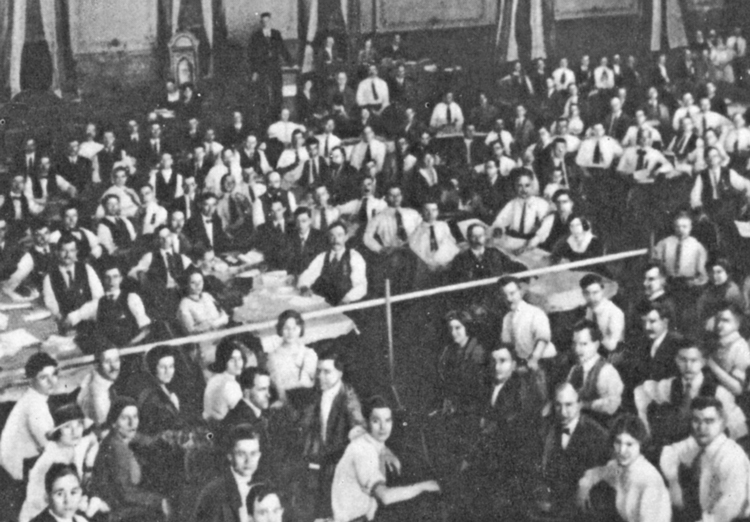Below is an excerpt from James P. Cannon’s The First Ten Years of American Communism, one of Pathfinder’s Books of the Month for September. Cannon was won to the example of the 1917 Bolshevik Revolution in Russia and became a leader of the Communist Party in the U.S. The book discusses the heroic and challenging early years of the party, Cannon’s relations with Russian revolutionary leaders V.I. Lenin and Leon Trotsky, and the CP’s growing abandonment of revolutionary perspectives and Stalinization. Reprinted by permission of Pathfinder Press.
BY JAMES P. CANNON
[T]he young militants of the new generation ought to know about it [the founding of the Communist Party, their forebearers] and claim it for their own. It belongs to them. The first six years of American communism — 1918-1923 — represent a heroic period from which all future revolutionary movements in this country will be the lineal descendants. There is no getting away from that. The revolutionist who would deny it is simply renouncing his own ancestry. That’s where he came from, and without it he would not be. …

I received your letter stating that you are working on a history of the American communist movement. I am interested in your project and am willing to give you all the help I can.
Your task will not be easy, for you will be traveling in an undiscovered country where most of the visible road signs are painted upside down and point in the wrong directions. All the reports that I have come across, both from the renegades and from the official apologists, are slanted and falsified. The objective historian will have to keep up a double guard in searching for the truth among all the conflicting reports.
The Stalinists are not only the most systematic and dedicated liars that history has yet produced; they have also won the flattering compliment of imitation from the professional anti-communists. The history of American communism is one subject on which different liars, for different reasons in each case, have had a field day. …
My writings on the early history of American communism are mainly designed to illustrate my basic thesis, which as far as I know, has not been expounded by anyone else. This thesis can be briefly stated as follows:
The Communist Party originally was a revolutionary organization. All the original leaders of the early Communist Party, who later split into three permanent factions within the party, began as American revolutionists with a perspective of revolution in this country. Otherwise, they wouldn’t have been in the movement in the first place and wouldn’t have split with the reformist socialists to organize the Communist Party.
Even if it is maintained that some of these leaders were careerists — a contention their later evolution tends to support — it still remains to be explained why they sought careers in the communist movement and not in the business or professional worlds, or in bourgeois politics, or in the trade-union officialdom. Opportunities in these fields were open to at least some of them, and were deliberately cast aside at the time.
In my opinion, the course of the leaders of American communism in its pioneer days, a course which entailed deprivations, hazards and penalties, can be explained only by the assumption that they were revolutionists to begin with; and that even the careerists among them believed in the future of the workers’ revolution in America and wished to ally themselves with this future.
It is needless to add that the rank and file of the party, who had no personal interests to serve, were animated by revolutionary convictions. By that I mean, they were believers in the perspective of revolution in this country, for I do not know any other kind of revolutionists.
The American Communist Party did not begin with Stalinism. The Stalinization of the party was rather the end result of a process of degeneration which began during the long boom of the Twenties. The protracted prosperity of that period, which came to be taken for permanence by the great mass of American people of all classes, did not fail to affect the Communist Party itself. It softened up the leading cadres of that party, and undermined their original confidence in the perspectives of a revolution in this country. This prepared them, eventually, for an easy acceptance of the Stalinist theory of “socialism in one country.”…
The degeneration of the Communist Party began when it abandoned the perspective of revolution in this country, and converted itself into a pressure group and cheering squad for the Stalinist bureaucracy in Russia — which it mistakenly took to be the custodian of a revolution “in another country.”
I shouldn’t neglect to add the final point of my thesis: The degeneration of the Communist Party is not to be explained by the summary conclusion that the leaders were a pack of scoundrels to begin with; although a considerable percentage of them — those who became Stalinists as well as those who became renegades — turned out eventually to be scoundrels of championship caliber; but by the circumstance that they fell victim to a false theory and a false perspective.
What happened to the Communist Party would happen without fail to any other party, including our own, if it should abandon its struggle for a social revolution in this country, as the realistic perspective of our epoch, and degrade itself to the role of sympathizer of revolutions in other countries.
I firmly believe that American revolutionists should indeed sympathize with revolutions in other lands, and try to help them in every way they can. But the best way to do that is to build a party with a confident perspective of a revolution in this country.
Without that perspective, a Communist or Socialist party belies its name. It ceases to be a help and becomes a hindrance to the revolutionary workers’ cause in its own country. And its sympathy for other revolutions isn’t worth much either.
That, in my opinion, is the true and correct explanation of the Rise and Fall of the American Communist Party.

